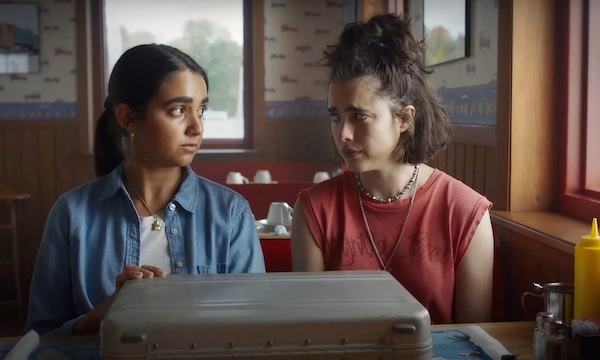Film Review: “Drive-Away Dolls” — Bum Trip
By Peter Keough
Drive-Away Dolls is the worst Coen brother movie ever made.
Drive-Away Dolls. Directed by Ethan Coen. Opens February 22 at the AMC Boston Common 19, the Kendall Square Cinema, the Coolidge Corner Theatre, the Alamo Drafthouse Seaport, the AMC Causeway 13, and the suburbs.

(L to R) Geraldine Viswanathan and Margaret Qualley in Drive-Away Dolls.
The inauspicious trailer notwithstanding, I had positive expectations for Drive-Away Dolls, a solo project by Ethan Coen (co-written with his wife, Tricia Cooke) of the famed filmmaking siblings. My hopes were sustained in the opening scene; it evoked the one from the Coens’ spectacular debut, Blood Simple (1984), in which the camera tracks along a bar and skips thoughtfully over the head of a passed-out customer. No skipping this time, but the sequence does climax with a use of corkscrews that would have made even Alfred Hitchcock shudder.
But not long afterwards my companion pointed out, “There was a reason Joel sat this one out.” Indeed. By that time the free-spirited (i.e., she has a potty mouth and speaks rapid-fire, unfunny, scatological dialogue with a Texas drawl) Jamie (Margaret Qualley) has indulged in several cartoonish sex scenes, including one in which the orgasmic yelps echo the death agony of a murder victim. The how-cool-is-this snarky contrast does not compensate for the leering voyeurism. In the vein of the supposedly liberated female sexuality exhibited in Yorgos Lanthimos’s similarly disappointing Poor Things (in which Qualley plays a small part as Felicity, an infantile, failed medical experiment), such gratuitous, crude, and unsexy raunch seems merely to serve prurient male fantasies.
Jamie is joined by another sapphic cliché, buttoned-up, uptight Marian (Geraldine Viswanathan), who wears stuffy suits, reads Henry James, and hasn’t had sex in, like, forever. Jamie wants to rectify this situation, so she insists on accompanying Marian on her trip from Philadelphia to visit her aunt in Tallahassee, Florida. A road movie, in other words, which promises to lead to a host of new wacky caricatures — rednecks, Black blues musicians, southern lesbian soccer players, a catatonic geriatric desk clerk on oxygen, and a prim elderly Black church lady.
To get there they take a drive-away car — free rentals driven back to their original locations. Unbeknownst to the pair, however, hidden in the trunk is a suitcase, a plot device that joins the ranks of other cinematic mystery boxes featured in such movies as Robert Aldrich’s Kiss Me Deadly (1955), Alex Cox’s Repo Man (1984), Quentin Tarantino’s Pulp Fiction (1994), and Ethan and Joel’s Barton Fink (1991). (Ethan should have realized that it is unwise for a director to make allusions in one’s movie to other, better movies, even if it is one of his own).
Be that as it may, as expected, the “goons” chase after the “dolls” to retrieve the suitcase, and those in pursuit — fussy, bossy Arliss (Joey Slatkin) and sensitive, psychopathic Flint (C.J. Wilson) — prove more entertaining than the pursued. They are fine entries in the distinguished Coen tradition of nasty, incompetent, oddly sympathetic heavies, going back to M. Emmet Walsh in Blood Simple. As the film cuts back and forth between conversations in the two cars, it quickly became clear to me in which vehicle I’d rather be traveling. Rosencrantz and Guildenstern they are not, but Arliss and Flint have the sweetness and innocence of Lennie and George in Of Mice and Men, as one character cattily refers to them.
Other diversions along the way include Curlie (Bill Camp), the eloquent, no-shit-taking proprietor of the fly-blown drive-away office, who pays the ultimate price for his low-rent eloquence. (“Why would anyone save Curlie?” he says in extremis. But they should). Then there are the cryptic hallucinogenic interludes evoking Peter Max posters by way of The Trip (1967) and Performance (1970), the explanation for which proves to be disappointing and dumb. They also provide the film’s bogus premise: these are artifacts from a youthful peccadillo that could supposedly undermine the political future of a rising right-wing politician, an indiscretion which, given the slew of atrocities that have been committed by current candidates and holders of high office, is quaint at best. Are they symbolic? A flaccid stab at the patriarchy? Sad, if so.
Maybe Ethan hasn’t been paying attention to what’s happening in the world lately. Though supposedly set in 1999, the whole film has a stale air about it, with “shocking” content that would have seemed tame or passé in the New Queer Cinema. Perhaps if it had been made by Gregg Araki or Lizzie Borden or some other genuinely transgressive filmmaker, it might have been edgier, relevant, and a lot more fun.
Peter Keough writes about film and other topics and has contributed to numerous publications. He had been the film editor of the Boston Phoenix from 1989 to its demise in 2013 and has edited three books on film, most recently For Kids of All Ages: The National Society of Film Critics on Children’s Movies (Rowman & Littlefield, 2019).
